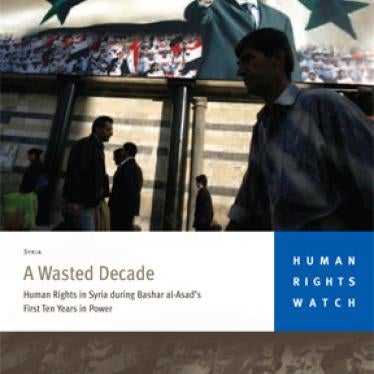Exactly a decade ago, a 34-year-old Bashar al-Assad stood before Syria's parliament and spoke of "the desperate need for constructive criticism", "transparency" and "democracy". Many Syrians believed the young president's promises in his inaugural speech, setting off a short-lived outpouring of discussion about the need for reform. But they paid a heavy price for their trust in Assad's words, because those who spoke out ended up in jail.
As Human Rights Watch's researcher for Syria, I have interviewed many of the Syrians who in good faith and sincere hope for their country's future took up the mantle of criticism and democratisation, and were arrested as a consequence. They include a former member of parliament who Syria's rulers decided was too "independent"; human rights lawyers who denounced rampant torture by the country's notorious security services; bloggers who criticised everyday corruption; and Kurdish activists who demanded official recognition of their language. (Assad's human rights record is reviewed in a new Human Rights report here.)
We initially talked in hushed conversations in Damascus cafes, following their release from prison, and they would describe their ordeals. But soon I started seeing more of them in Beirut, where they had escaped from Syria, on their way to be resettled as refugees in far-away lands. With each passing year, the space for communication shrank, with meetings in Syria becoming more dangerous for activists and lawyers constantly tailed by government spies. Today, the internet remains one of the few areas where we can communicate "freely" - or so I hope, given Syria's increasing sophistication in monitoring online communications.
It didn't all start this way. A Syrian activist described Assad's inaugural speech as "the end of a nightmare" - a breath of fresh air following the "totalitarian years of Hafez al-Assad". The young doctor Assad did seem promising. Soft-spoken and western-trained, as many commentators regularly noted, he seemed eager to turn a new page for Syria. His articulate and attractive wife, a former banker in London, helped project an image of a dynamic presidential couple. But the initial hopes quickly evaporated.
Within a year of his ascent to power, Assad was filling Syria's prisons again with dissidents, journalists and human rights critics. Syria's security agencies, the feared mukhabarat, started detaining people again, without arrest warrants, and torturing them with complete impunity. Promises by Assad for new laws that would broaden political and civil society participation did not materialise.
What went wrong? For many analysts, Assad was hampered in his reforms by an entrenched "old guard" that refused to tolerate any criticism. But if that was the case, why has he not kept his promises in the ensuing years, after consolidating his power base and naming his own people to key positions?
In his few public speeches, Assad has justified the lack of political reforms either by arguing that his priority is economic reform, or stating that regional developments - namely the war in Iraq - have interfered with his reform agenda.
But this is not convincing. Assad's crackdown on dissidents began in August 2001, before the US invaded Iraq, and continued throughout the decade, irrespective of the state of Syria's relations with the international community. In fact, Syria's improved relations with the west in the last three years have not led to any improvement in its human rights record. In the last three weeks alone, Syrian criminal courts separately sentenced two of Syria's leading human rights lawyers, Muhanad al-Hasani, 42, and Haytham al-Maleh, 78, to three years in jail each for their criticisms of Syria's human rights record.
Syria's opaque decision-making process makes it very difficult to know the real reasons that drove Assad early on to loosen some of the country's restrictions on expression and public gatherings, only to clamp down a few months later and increasingly tighten his grip ever since.
What is clear from a review of his decade in power, however, is that he has no true commitment to broadening public freedoms for Syria's citizens, perhaps the most repressed in the entire Arab world. What initiatives he has taken have been limited at best; he removed a ban on independent publications, but the only two private newspapers allowed to cover political topics are owned by businessmen closely tied to his government.
On the surface, Syria is a less menacing place than it was in the 1980s. Visitors to Damascus - one of this year's hot travel destinations - are likely to stay in smart boutique hotels and dine in new restaurants. But scratch the surface, something few foreigners do, and the reality is as bleak as ever. As a prominent dissident told me recently: "In the 1980s, we went to jail without trial. Now, we get a trial, but we still go to jail."
Assad enters his second decade in office with a much tighter grip on power. He is unchallenged internally and has solidified his international standing. But his legacy will ultimately depend on whether he will act on the promises he made in that distant July 2000. Otherwise, he will merely be remembered for extending his father's domestic one: government by repression.







